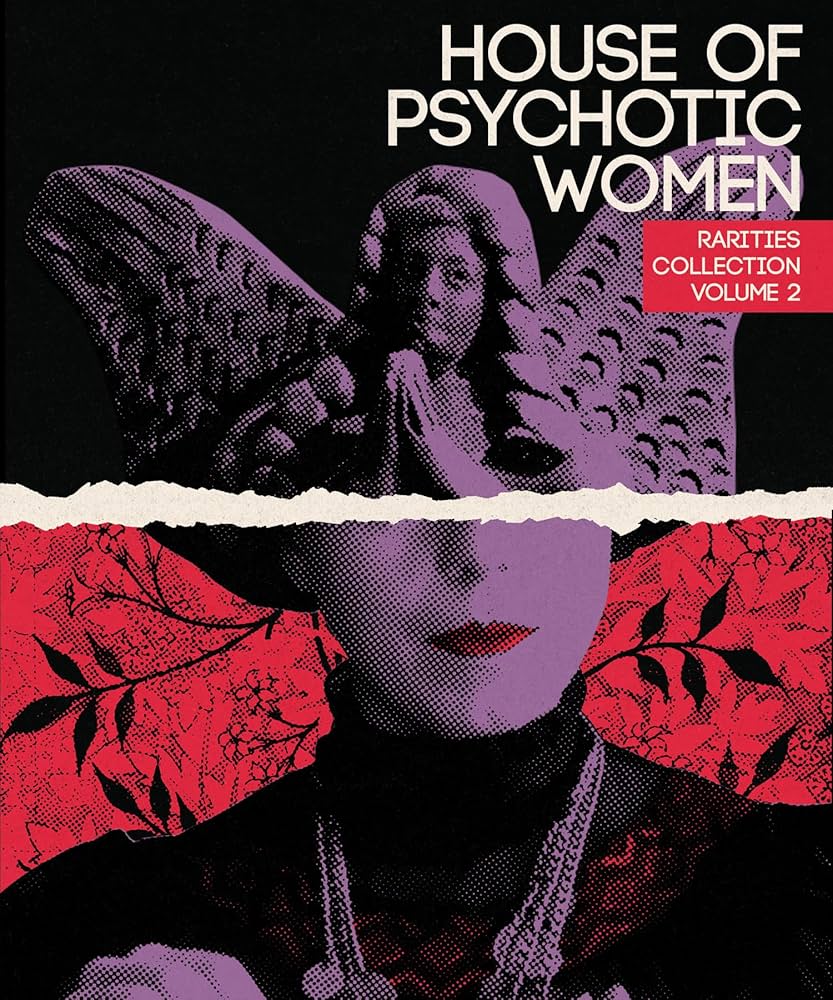Following up the first collection of films featured in Kier-La Janisse’s excellent deep dive into films featuring women submerged in neuroses, Severin has assembled another fine box set of curious and fascinating arthouse genre pictures involving women unsound in mind and unfettered from the traditional bonds of emotional restraint. Let us dig in and experience the madness!
Butterfly Kiss
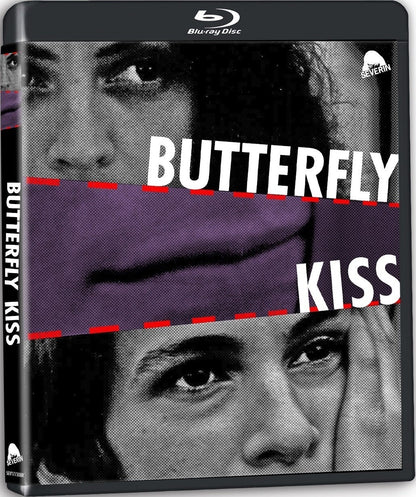
Miriam (Saskia Reeves) lives out her dull days working as the cashier at a filling station in northern England. Unbeknownst to her, Miriam’s life is about to be shocked and altered to its core when an eccentric woman named Eunice (Amanda Plummer) stumbles into her store one day, asking for a particular record she doesn’t know the name of (they don’t sell records anyway) and looking for a woman named Judith. Miriam decides on something of a whim out of sympathy to take Eunice home with her, only to discover that Eunice is out of her mind. Despite the mood swings and murder, Miriam can’t help but follow Eunice on a cross-country crime spree to find the ever-elusive Judith.
Amanda Plummer is an absolute elemental force in this film, barreling through it with a manic, life-ruining energy. Miriam can’t help but be sucked into Eunice’s orbit. Stuck in a dead end job with no prospects for a future beyond living in a grey, washed out landscape of endless tedium, it feels inevitable that Miriam decides to follow Eunice, eventually becoming complicit in her crimes. It isn’t as if Eunice is hiding who she is. She comes across as mentally unsound from the start, flitting about the store, demanding a record of a song she doesn’t know the name of and of a woman named Judith who she claims to be in love with. Immediately upon arriving at Miriam’s flat, Eunice confronts her with her many piercings and scars. She’s nothing but a bundle of red flags, but Miriam doesn’t care. Miriam and Eunice are yin and yang, disparate but necessarily together. Butterfly Kiss was Michael Winterbottom’s feature film debut after a long stint directing for television, and it’s certainly a bold film to put forth as your calling card. But it also encapsulates much of what would preoccupy the rest of Winterbottom’s career, the search for a kind of emotional truth regardless of the controversy it may court. Winterbottom shoots the murders with the same kind of passive gaze as Miriam’s drab gas station job. Rather than being the focal point, the killings act as a stepping stone to track Eunice’s and Miriam’s relationship. By the end, love and violence have intertwined so much that no one can tell a difference.
Butterfly Kiss comes to blu-ray in a nicely saturated, naturalistic, filmic transfer scanned by BFI in 2K from the original negative. It looks quite good and shows off the film’s cinematography very well. The stereo audio track is similarly nicely mixed, and while the film isn’t the most explosive aurally, it still has a nice separation and robustness to it. First on extras, we have an introduction by Kier-La Janisse, the author of the book House of Psychotic Women, as well as an introduction by screenwriter of Butterfly Kiss Frank Cottrell-Boyce. We also have an excellent audio commentary by film historian Kat Ellinger. If you’ve never heard a commentary from her, you are in for a treat. Kat’s full of interesting information and insights delivered in a very engaging way in a refreshingly unpretentious style. We also get interviews with director Michael Winterbottom, actresses Amanda Plummer and Saskia Reeves, producer Julie Baines and cinematographer Seamus McGarvey. All these collectively are also packed with interesting reminiscences and observations on the film. To top it all off, we get an additional short film Pleasures of War, directed by Ruth Lingford in 1998. It’s a very good animated short about a woman on the warpath of revenge done in an interesting almost woodcut style.
Morgiana
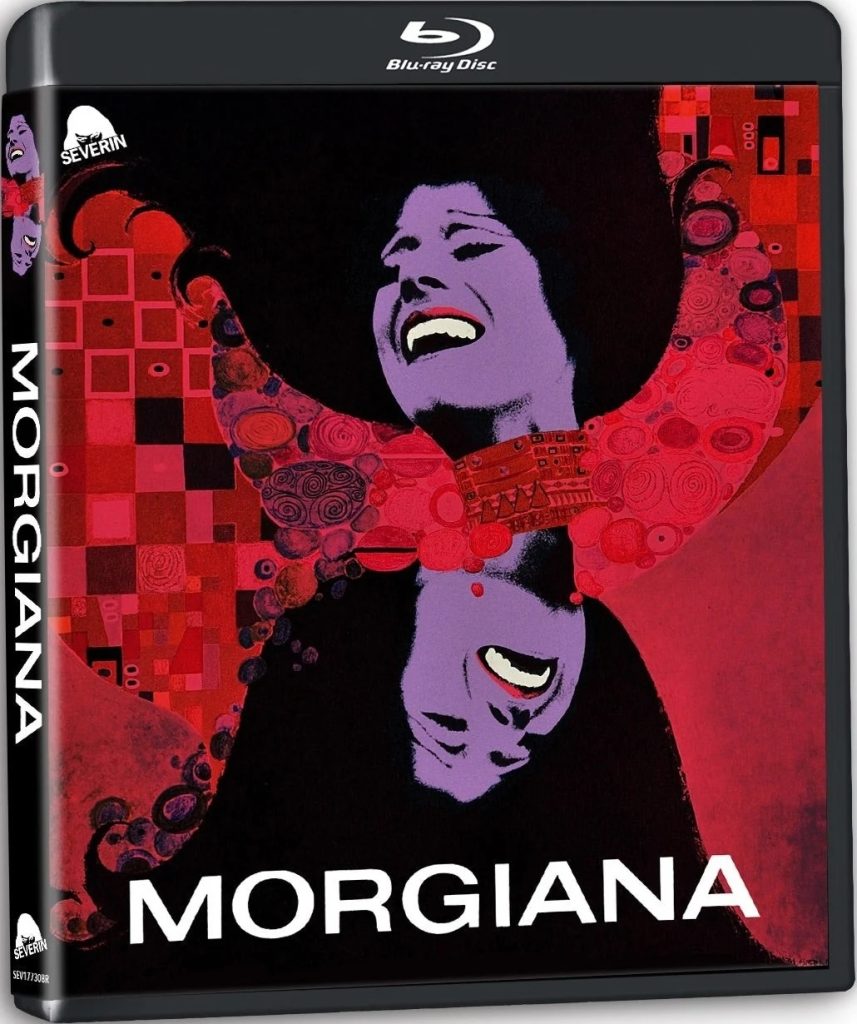
Klara and Viktoria (both played by Iva Janzurová) are sisters who find themselves at odds over their father’s inheritance when he suddenly dies, leaving the bulk of his fortune to the good-hearted Klara. Naturally the more embittered, darker-hearted Viktoria is furious with the decision and begins plotting revenge on Klara which becomes only exacerbated by Klara’s radiant personality attracting the attentions of a suitor who Viktoria favors. As Klara’s constitution grows weaker and weaker from the slow poisoning of her tea, Viktoria finds herself taking increasingly drastic risks to cover up her deadly deeds.
Juraj Herz is, at least as far as I’ve observed, one of the least appreciated (perhaps due to his more radical genre tendencies) purveyors of the Czech New Wave of the 1960s and ’70s, and Morgiana is one of his best films. Often compared to Valerie and Her Week of Wonders which also features a kind of hallucinatory pop art aesthetic, the plotting couldn’t be more different with Morgiana feeling more like it takes a page from the likes of Alfred Hitchcock or Henri-Georges Clouzot. Iva Janzurová is a wonder herself, portraying both sisters each in distinctly unique ways to where it is at no point confusing as to who is who, and while the costuming does much to separate them, with Klara’s bright whites and red curls piled high contrasting distinctly with Viktoria’s darker, more gothic apparel, Janzurová plays them very differently as well. You can tell Viktoria from Klara at a glance. Viktoria looks as if the world owes her, her avarice and jealousy souring her expression and mood. Klara expects the best in everyone and looks as if she doesn’t have a care in the world. It really is a marvelous performance deserving of any and all acclaim it receives.
Morgiana comes to blu-ray in an excellent 4K scan from the original camera negative provided by the National Film Archive of Prague. Director Herz and cinematographer Jaroslav Kucera really pull out all the stops here with vibrant, highly contrasting color schemes, and the transfer really makes those colors pop vividly. The original Czech mono audio track is nicely done with no noticeable hiss or distortion as well. Once again, we are treated to an introduction by Kier-La Janisse who does a good job of succinctly summing up the importance of the film and its positive qualities. Next we have a solid and engaging audio commentary from Briony Kidd (Stranger with my Face Festival Director) and Cerise Howard (Co-Founder of the Czech and Slovak Film Festival of Australia). We also get a nice interview with Iva Janzurová on how she got involved in the film and ended up playing both leads as well as an animated short film by Leslie Supnet narrated by Lier-La Janisse that focuses on the interesting shooting location of Pobiti Kamani. Another neat inclusion is a bizarre vampire musical called Nightmares that Juraj Herz shot for TV in 1970. Finally the short film included on this disc is Rest in Peace directed by Rachel Amodeo in 1998. It’s a thematically appropriate story of sisters, one stealing from the corpse of the other and is a pretty neat inclusion.
The Savage Eye
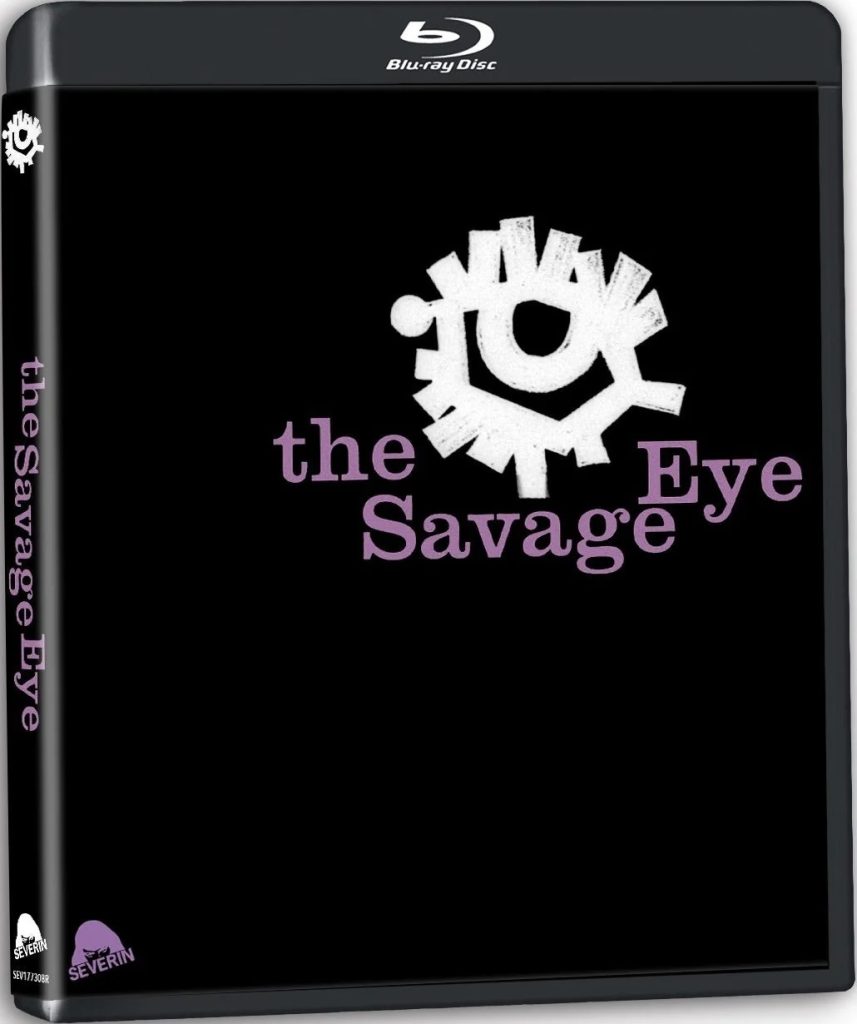
Judith (Barbara Baxley) is heavy of heart and still trying to get over a recent divorce. She walks the streets of Los Angeles searching for something she can’t tangibly identify while discussing her inner thoughts with an anonymous person only credited as The Poet (Gary Merrill). She wanders aimlessly through roller derbies and wrestling matches, jazz clubs and churches, down darkened streets and tunnels, witnessing the city’s pain, joy, suffering and anger as a kind of stranger passing in the night.
As a narrative, The Savage Eye is lacking. As a visual essay on capturing the time and place of Los Angeles in the late ’50s, particularly the seedy underbelly of the city we have read about in hard-boiled crime novels like those of James Ellroy, it is endlessly fascinating. Barbara Baxley is perfectly cast here as a woman lost in the dark emotionally and physically, grasping at anything to distract her from her internal misery. We watch her visit various places most see as escapist entertainment, but Judith just passes through like a spirit in a trance. And that’s what watching this film is like, living in a trance. We hear the voiceover of The Poet expressing what I believe are Judith’s inner thoughts. In fact, I think The Poet isn’t real but a sort of manifestation of Judith’s internal desires and observations. Another interesting aspect of this film is the pedigree behind it. Featuring three future Oscar-nominated cinematographers (Jack Couffer, Helen Levitt and Haskell Wexler), the film has a gritty noir-ish look that captures L. A. with a striking eye for detail. If a film has portrayed the dark streets of L. A. in the 1950s better, I’m not sure that I’ve seen it.
The newly 4k scanned transfer done by Severin themselves from the original camera negative is actually quite stunning, especially considering how obscure and low budget this film was initially. The grain levels are excellent and the blacks are deep and solid. Very well done! The mono audio track represents the cool jazzy soundtrack quite well, clear of any distracting damage. For extras we first get an interesting audio commentary by film curator/historian Elizabeth Purcell that is packed with all kinds of info about the film. We also get a cool video essay on the film’s shooting locations by Kim Cooper of the Esotouric blog, an archival interview co-director Joseph Strick and a Trailers from Hell commentary by Kier-La Janisse (which acts in a similar capacity to her introductions on the other discs by providing well-summarized info about the film in a compact package). This disc actually has a couple of short films included. First is Interviews with My Lai Veterans, directed by co-director of The Savage Eye Joseph Strick. It’s a potent documentary interviewing several of the soldiers involved in the My Lai Massacre, capturing their conflicting testimonies in terms of complicity. We also get an interview with Strick about the short film. Finally we have the short film Miss Candace Hilligoss’ Flickering Halo by Vincenzo Core and Fabio Scacchiolli. This was a weird one with some quite striking visuals.
The Glass Ceiling
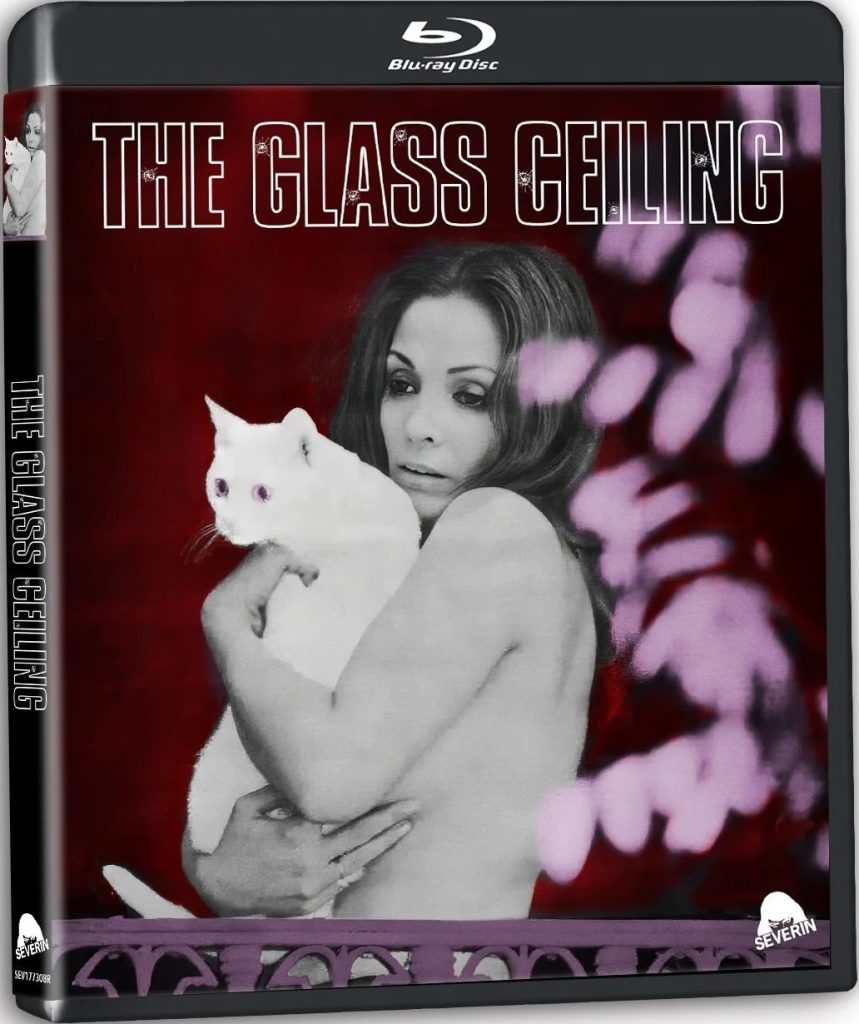
Marta (Carmen Sevilla) is left alone is an apartment building populated with eccentrics by her husband (Fernando Cebrián) who has to go out of town on a business trip for several days. Soon after he leaves, she begins hearing strange and mysterious noises through the ceiling of the apartment above and begins to suspect that her upstairs neighbor Julie (Patty Shepard) has killed her husband, Viktor. If she did kill him, how did she do it and what did she do with the body? Also who is the weirdo taking scandalous pictures of all the women in the building? Is Judith being paranoid or is something horrifying really going on?
Director Eloy de la Iglesia is perhaps better known for the video nasty Cannibal Man, but he directs this Spanish thriller like a seasoned pro of the giallo form. Glass Ceiling has a remarkable sense of paranoia and claustrophobia that at times will bring to mind Rosemary’s Baby, with its apartment building full of eccentrics. But by making it set in a building outside the city, it puts Marta in an even more isolated situation. With her husband out of town, there really is nothing to do but let her imagination run wild. The plotting and pacing are reminiscent of Hitchcock at his most taut while the directing is all dutch angles and extreme close-ups. Carmen Sevilla is excellent in a role that requires her to convey much of what she feels through expression and body language.
The transfer for Glass Ceiling was scanned in 4K from the original negative, and while it does appear a little heavy on the grain, it never feels like it sacrifices detail. Otherwise, it captures the filmic look of this cool Spanish giallo quite well. We also get both the English and Spanish mono tracks with both similarly sufficient and clean but hardly earth-shattering. first on the extras, we get another fine introduction from Kier-La Janisse as well as another well done, info-filled audio commentary by film author Shelagh Rowan-Legg and Alexandra West, co-host of the Faculty of Horror podcast. Severin in general is very good at audio commentaries, getting proper experts of the film to supplement the feature. We also get an interview with Judith Chapman, sister of actress Patty Shepard, reminiscing about her sister and how she got involved in the world of film. The disc also includes alternate scenes from the TV version of the film and the original trailer. The short film on this disc is Anta Mujer by Agusti Villaronga (director of cult films like In A Glass Cage and Moon Child). It’s a bizarre one involving a woman traveling to find five portents. What they are and what their significance is was all rather vague and ethereal.
Severin has once again proven that they truly are the kings of the themed box set. Possibly putting together an even stronger collection of films than in the first volume, Severin has delivered a dynamite package of great arthouse genre films with an excellent slate of meaningful extras and a set of great transfers. Highly recommended!

